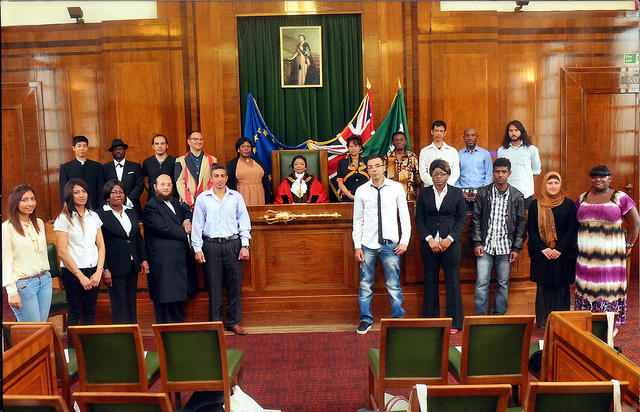Citizenship ceremonies reveal the ignorance of real experiences of migration to the UK
Drawing on research for her book Making Citizens, Bridget Byrne explores how citizenship ceremonies often hear claims that the UK is a welcoming place, in contrast to new citizens’ actual experiences, which are often coloured by difficult experiences at the hands of the authorities.

A UK citizenship ceremony in Hackney, London (Cory Doctorow, CC BY SA 2.0)
Citizenship ceremonies have been taking place in the UK for over a decade. They are very common – taking place, often weekly, in cities and towns across the UK – yet they get very little coverage in the media. Relatively few UK-born citizens have ever had a reason (or invitation) to go to one. The first ceremony I went to was as a guest of a friend who was receiving UK citizenship.
At the ceremony, I was particularly interested in the representation given in the ‘welcome speech’ of Manchester as a city built by migrants. What, I wondered, would they have said about migrants and diversity in a ceremony in Cumbria (where my friend lived part of the time/often stayed), one of the whitest areas of Britain. This question set me on a journey round the UK to answer that question. I also wanted to discover what the new citizens themselves felt about the welcome they were given, both in the citizenship ceremony and when they came to the UK several years before.
One question which has concerned me, the choice of the New Labour government (which introduced ceremonies for new citizens in 2004) to stipulate a ‘local welcome’ speech is perhaps unfortunate.
A welcome suggests something that is given by a host to a guest. It fails to acknowledge the long residence of anyone who gets to the stage of qualifying to become a citizen. It positions them as outside the local community. Perhaps a ‘celebration’ would have been preferable. For many new citizens, gaining citizenship was indeed something to be celebrated. It felt for many like an accomplishment, giving a sense of security and stability, and was the culmination of a long, bureaucratic and sometimes intrusive process.
When you look at the welcomes given in the ceremonies – I examined nearly 50, details of which were sent to me by local registrars from across the UK – you find that they often treat new citizens as newcomers. The speeches contain the kind of local information that would be supplied to a tourist – telling them about local history and landmarks or local festivals, etc. The choices of which histories to tell was revealing. The dominant narratives were of pre-Norman inhabitants, settlers and invaders, with barely any mention of 20th century history, or of histories of Empire and Commonwealth which might have been more relevant to many new citizens.
Where migration is touched on, there are often strong claims for the local welcomes made in particular towns, cities or areas, often along the lines of ‘X has a long history of welcoming migrants’. However, while the new citizens I interviewed found the ceremonies themselves welcoming, many had not found the experience of moving to the UK itself an easy process. Some were faced with a culture of disbelief at borders and by immigration officers. Their reasons for moving, their marriages, and even the paternity of their children could all come under question. Some had faced direct and sometimes violent racism as they moved into new areas to live and work. For others, there was a sense that the British (and Northern Irish), while not necessarily hostile, are somewhat reserved and may not be the best at welcoming newcomers.
Migrants to the UK are surrounded by public debates about immigration. Perhaps unsurprisingly, those new citizens I interviewed were very aware of the ways in which immigration and multiculturalism were hot political topics in the UK. They knew that inward migration is often blamed for putting pressure on services and cultural stability. They were aware of discourses about ‘bogus’ asylum seekers and ‘illegal’ economic migrants. These public debates do not always feel welcoming to those coming into the country, whatever their reasons for being there.
Citizenship ceremonies at present perhaps reveal mostly the ignorance of real experiences of migration to the UK. They are a place where the British reassure themselves with rose-tinted histories of their welcome to newcomers and their embrace of multiculturalism.
It would surely be better if the ceremonies instead became a celebration of those who have become new UK citizens and to recognise migrant contributions to the UK’s economy, culture and society. Conducted differently, they could also be an opportunity for the wider community to reflect on the meanings of both citizenship and our national cultures of welcome and inclusion. The ceremonies could consider what it means to be a citizen – and how citizens by birth, naturalised citizens and other residents can all participate in local communities, contributing to our public culture.
—
This piece originally appeared on the Manchester Policy Blogs site and is reposted with permission. It represents the views of the author and not those of Democratic Audit UK or the LSE. Please read our comments policy before posting.
—
 Dr Bridget Byrne is a senior lecturer in sociology at the University of Manchester and a member of the Centre on the Dynamics of Ethnicity and Inequality (CoDE).
Dr Bridget Byrne is a senior lecturer in sociology at the University of Manchester and a member of the Centre on the Dynamics of Ethnicity and Inequality (CoDE).





 Democratic Audit's core funding is provided by the Joseph Rowntree Charitable Trust. Additional funding is provided by the London School of Economics.
Democratic Audit's core funding is provided by the Joseph Rowntree Charitable Trust. Additional funding is provided by the London School of Economics.
‘Citizenship ceremonies reveal ignorance of real experiences of migration’ writes @bridgetbyrne3 for @democraticaudit https://t.co/Xhbxuomv0G
Citizenship ceremonies reveal the ignorance of real experiences of migration to the UK https://t.co/wcZeXWpVi1
Citizenship ceremonies reveal the ignorance of real experiences of migration to the UK: Drawing on research fo… https://t.co/phcsIWv3hm
Citizenship ceremonies reveal the ignorance of real experiences of migration to the UK, argues Bridget Byrne https://t.co/PMSGzOTUUu
Citizenship ceremonies reveal the ignorance of real experiences of migration to the UK https://t.co/MwoFRkic2J #Option2Spoil
Citizenship ceremonies reveal the ignorance of real experiences of migration to the UK https://t.co/KDboSh7p3F https://t.co/N1N9xHNYwX